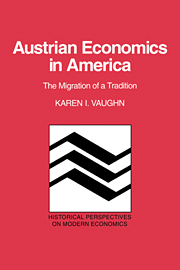Book contents
- Frontmatter
- Contents
- Preface
- Acknowledgments
- 1 Introduction
- 2 Carl Menger and the foundations of Austrian economics
- 3 Economic calculation and the rediscovery of Mengerian themes
- 4 Ludwig von Mises: Austrian economics in America
- 5 The Austrian revival
- 6 Defining the Austrian paradigm
- 7 Market process: the problem of order in Austrian economics
- 8 Austrian economics: which way forward?
- References
- Index
2 - Carl Menger and the foundations of Austrian economics
Published online by Cambridge University Press: 06 October 2009
- Frontmatter
- Contents
- Preface
- Acknowledgments
- 1 Introduction
- 2 Carl Menger and the foundations of Austrian economics
- 3 Economic calculation and the rediscovery of Mengerian themes
- 4 Ludwig von Mises: Austrian economics in America
- 5 The Austrian revival
- 6 Defining the Austrian paradigm
- 7 Market process: the problem of order in Austrian economics
- 8 Austrian economics: which way forward?
- References
- Index
Summary
Modern Austrians of all stripes uniformly trace their beginnings back to the writings of Carl Menger (1840–1921), and especially to his Principles of Economics (1981), first published in 1871. Yet in many respects, Menger is an enigmatic ancestor whose work is only now beginning to be fully understood. And the more that we know of Menger's writings, the more it becomes obvious that Menger was a complex thinker whose unresolved theoretical problems are parent to at least two different modern Austrian views.
That this is the case is underlined by the contrasting ways in which Menger's writings have been interpreted in the twentieth century. He can and has been interpreted both as an unproblematic founder of neoclassical economics and as the originator of an alternative style of economic reasoning that challenges the neoclassical orthodoxy. Both interpretations can be supported by good textual evidence. Although ultimately I think the interpretation that stresses Menger's differences from neoclassical economics is the more convincing one, it is by no means decisively so.
The textual ambiguities that account for much of the disagreement over the real Mengerian message will constitute the heart of this chapter. But first it is important to note another reason for the existence of starkly contrasting interpretations of Menger's place in the development of economic thought: the relative inaccessibility of Menger's text even within his own lifetime and certainly for years after his death.
- Type
- Chapter
- Information
- Austrian Economics in AmericaThe Migration of a Tradition, pp. 12 - 37Publisher: Cambridge University PressPrint publication year: 1994

